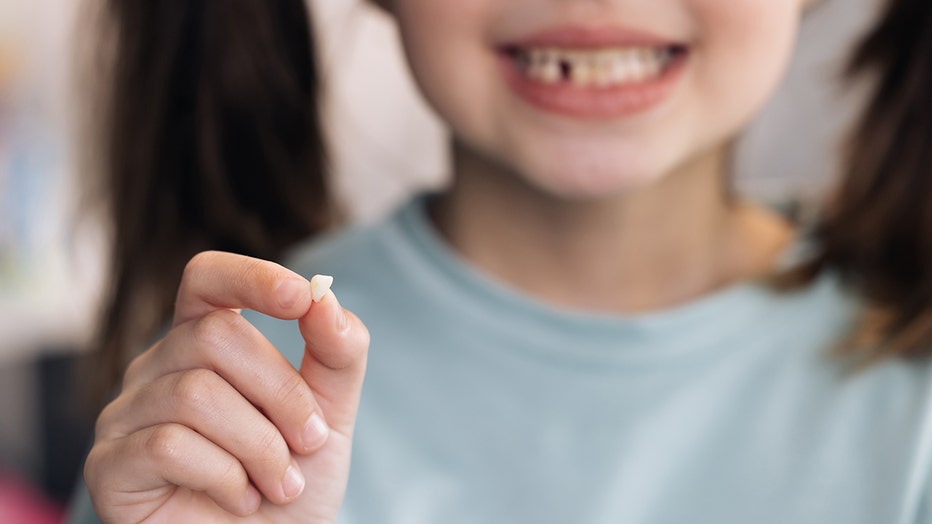Here’s how much money the Tooth Fairy gives on average per tooth
The Tooth Fairy may be tightening her purse strings.
On Tuesday, Delta Dental released new findings from its 2024 Original Tooth Fairy Poll in honor of National Tooth Fairy Day on August 22.
According to the company, the poll was conducted between Jan. 3, 2024 and Jan. 17, 2024, among 1,000 parents of children ages 6 to 12.
How much is a lost tooth worth?
Delta Dental revealed that the Tooth Fairy is dropping the value of a tooth for the first time in five years.
According to the data, the average value of a single lost tooth during the past year declined by 6% from $6.23 to $5.84.

FILE: Girl holds her lost tooth. (Credit: Getty)
For a first tooth, the average value also dropped from $7.29 to $7.09 over the past year.
"Delta Dental has tracked U.S. Tooth Fairy giving trends for 26 years as a timely way to spotlight the importance of children’s oral health," Gabriella Ferroni, the senior director of strategic communications for Delta Dental Plans Association, said in a statement. "It is not a surprise to see she tightened her purse strings following last year’s record high. Despite the more economical reward, Tooth Fairy giving is a fun conversation starter to encourage good oral hygiene habits at an early age."
Historically, the Original Tooth Fairy Poll has typically mirrored the economy's overall direction, tracking with the trends of Standard & Poor's 500 Index (S&P 500). However, in 2023, the value of a lost tooth went in a different direction, and this continues in 2024, according to Delta Dental. The average value of a single lost tooth decreased 6% over the past year, while the S&P 500 experienced a 20% increase during the same period.
Which region pays most for lost tooth?
The West surged ahead of the pack to lead U.S. regions with the highest monetary gift for a lost tooth, marking a 37% increase since last year’s results. The average price for a lost tooth in the West was $8.54.
Meanwhile, the Northeast increased 12% to $6.87 and surpassed the national average by more than $1.00.
In contrast, the South and Midwest decreased. The south dropped below the national average to $5.51, after leading last year with $6.59 for a lost tooth. In addition, the Midwest significantly trailed the national average with a 36% drop with an average of $3.63.
The Tooth Fairy welcomed into most US homes
The poll also found that the tooth fairy was welcomed into approximately 8 in 10 (78%) U.S. homes, and more than 1 in 4 children (27%) go to bed early when they have a lost tooth in anticipation of the Tooth Fairy’s arrival.
Now in its 26th year, Delta Dental said the poll reveals the tooth fairy provides practical benefits for both children and adults. More than 1 in 3 parents (34%) said the Tooth Fairy visits are a positive way to instill good oral health habits, and nearly 1 in 5 (18%) claimed the Tooth Fairy’s generosity was contingent on their child’s dental hygiene. Further, about 1 in 4 parents (22%) believed the tradition helped teach their children about the value of money.
EARLIER: Tooth fairy payouts plummet 1st time in 5 years, dental poll finds
"Not only is the Tooth Fairy a time-honored tradition in most homes across the country, but she is an ally for parents to help children develop proper oral hygiene habits," Ferroni continued. "Delta Dental continues to track Tooth Fairy giving as a playful way to educate children about the importance of good oral health, which supports overall health."

